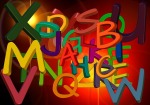Have you ever thought that the world of social media has plunged us deep into a bowl of alphabet soup and left us to climb out as best we can?
I’m referring to acronyms, of course – those “words” that are created by taking the first letter of a longer phrase or title and stringing them together. We all use acronyms in our conversations – think NATO, for example (North American Treaty Organization). Sometimes, they are even so well integrated into our language that we forget that the term we’re using is actually an acronym; scuba (self-contained underwater breathing apparatus) is one that comes to mind.
The advent of social media and cellphone technology, however, has taken acronyms to whole new level. Given the character limits imposed by Twitter and the need for speed when texting — or  the reluctance to type more characters than is absolutely necessary – an entire new collection of acronyms has come into being. These acronyms are rarely spoken, because they are generally unpronounceable (LMAO, anyone?), and besides, they were designed for an online medium that is read, not verbalized.
the reluctance to type more characters than is absolutely necessary – an entire new collection of acronyms has come into being. These acronyms are rarely spoken, because they are generally unpronounceable (LMAO, anyone?), and besides, they were designed for an online medium that is read, not verbalized.
If you are new to texting or to Twitter, you are suddenly assaulted by a barrage of terms that seems foreign and incomprehensible. When I first came across LOL (laugh out loud), I was puzzled. Lots of love? How did that relate to the sentence I had just read?
It’s all a matter of exposure, however. Everyone can play the game – they just need a teacher to guide them through kindergarten, as it were. These days, I can decipher online acronyms with the best of them. IMHO? In my humble opinion, of course. ICYMI? In case you missed it.
Today, when I come across an online acronym I can’t identify, I just say WTH* (What the heck – known in other circles as WTF) and google the translation. If you haven’t yet made the acquaintance of online acronyms, it’s time to GWTP* (Get with the program) before you drown in your soup.
*My own creation
